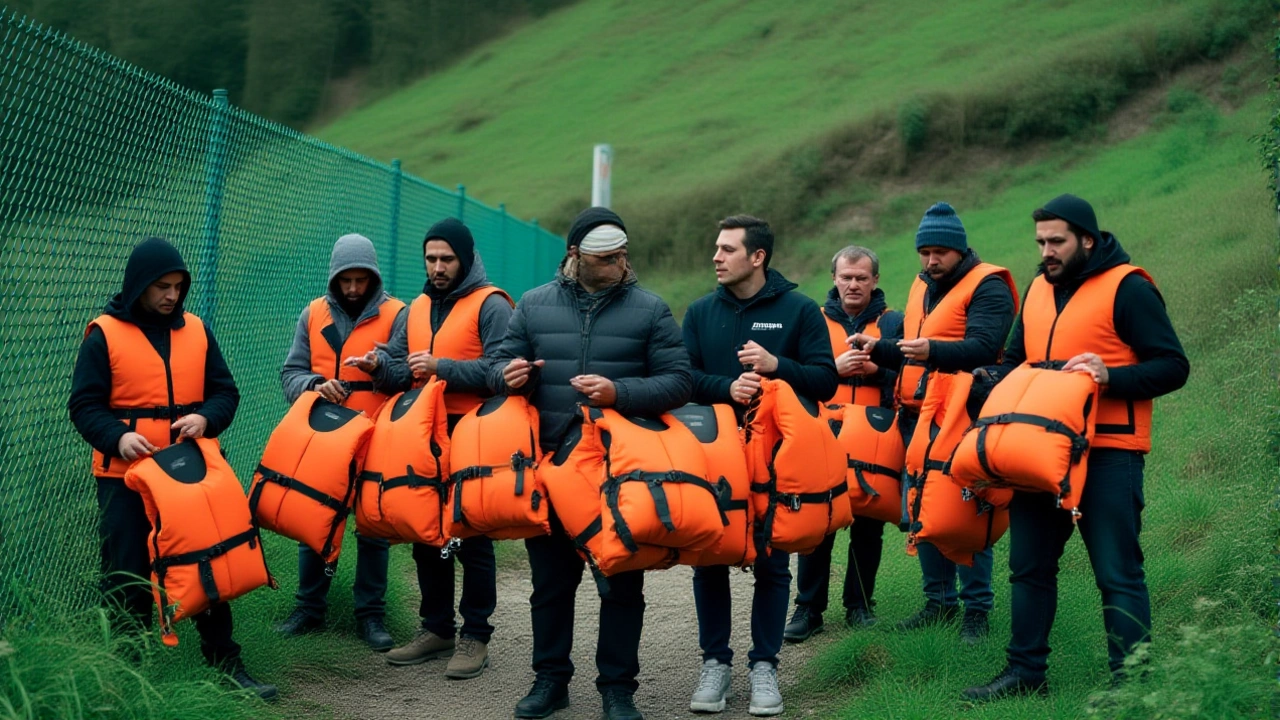On June 19, 2025, French border police discovered a wave of lorries dumping migrants on the sand at northern French beaches – a tactic designed to slip past coastal patrols and force a scramble among authorities. The move comes just weeks after a flurry of UK‑led sanctions and new legislation aimed at cutting the lifelines of organised people‑smuggling rings.
At the heart of the crackdown is a coalition known as the Calais GroupLondon, which convened on December 10, 2024 under the watchful eye of Yvette Cooper, Home Secretary, UK Home Office and German Interior Minister Nancy Faeser, Federal Minister of the Interior and Community, Federal Republic of Germany. Representatives from Belgium, France, the Netherlands, the European Commission, Europol and Frontex also took part.
New smuggling routes and tactics
Smugglers have shifted from the classic tiny boats to a two‑stage operation: first, they post recruitment ads on Instagram, TikTok and encrypted messaging apps – a method that now accounts for roughly 80% of contacts with would‑be migrants. Once a migrant agrees, a convoy of lorries ferries them across the French‑Belgian border, parks on the dunes of Calais, and hands them over to small‑boat crews for a final crossing of the Channel.
The lorry‑based drop‑offs are designed to outmaneuver the French gendarmerie’s coastal radar and to create congestion on the beaches, making it harder for patrols to spot illegal departures. Interior Ministry analysts say the tactic emerged after a series of successful interceptions of small‑boat launches in 2023‑24.
International crackdown and sanctions
In response, the UK Foreign Office published a sanctions list on July 23, 2025 that freezes assets and bans travel for 24 individuals and entities linked to the network. The list, corroborated by WorldEcr, includes Albanian national Bledar Lala, who runs the "Belgium operations" of an organised crime group that ships migrants to the UK, and former Serbian police translator Alen Basil, accused of running a large smuggling ring from a €1,000,000 mansion bought with extorted funds.
One of the most unusual entries is a Chinese manufacturer, Weihai Yamar Outdoors Product Co, sanctioned for producing inflatable boats advertised on illicit forums. Foreign Secretary David Lammy hailed the move as "a landmark moment" in the fight against organised immigration crime.
Legislative response in the UK
On August 3, 2025, Crime and Policing Minister Dame Diana Johnson announced a new law that makes it a criminal offence to advertise smuggling services on social media, carrying a maximum five‑year prison term and provisions for asset freezes. The legislation also empowers authorities to block financial accounts tied to smuggling networks.
According to the Home Office, more than 25,000 Channel crossing attempts were recorded by August 2025, a figure that mirrors the sharp rise in social‑media‑based recruitment. The new law aims to cut that pipeline at its source.
Impact on migrants and enforcement challenges
For migrants, the lorry‑to‑beach method has introduced a new set of hazards. The short‑notice drop‑offs mean many are rushed onto overcrowded inflatable boats that lack proper safety gear. Over the past six months, French authorities report a 12% uptick in drownings linked to these makeshift vessels.
Corruption remains a stubborn obstacle. In Serbia, Alen Basil reportedly bribed local police to turn a blind eye, allowing his network to operate with impunity for years. While the sanctions freeze his overseas accounts, local investigations are still pending.

Looking ahead: cooperation and remaining hurdles
The Calais Group’s 2025 Priority Plan outlines a five‑point framework focusing on real‑time intelligence sharing, joint maritime patrols, and coordinated legal actions. Early successes include the seizure of 600 life jackets destined for the Channel and the arrest of more than 20 key players across Europe.
Yet officials admit the battle is far from over. “We continue to see smugglers innovate faster than we can legislate,” warned Nancy Faeser in a press briefing last week. The next steps involve tightening Hawala money‑transfer monitoring and expanding the sanctions regime to cover more manufacturers in Asia.
Key Facts
- June 19, 2025: French police spot lorry‑dumped migrants on northern beaches.
- July 23, 2025: UK sanctions 24 smugglers and a Chinese boat maker.
- August 3, 2025: New UK law criminalises social‑media smuggling ads.
- 80% of migrants contact smugglers via social platforms.
- Over 25,000 Channel crossing attempts recorded by August 2025.
Frequently Asked Questions
How do the new lorry tactics affect French border security?
The lorry drop‑offs bypass traditional coastal checkpoints, forcing French gendarmes to monitor inland road networks and beach fronts simultaneously. This stretches resources and creates blind spots that smugglers exploit, leading to a measurable rise in maritime incidents near Calais.
What specific sanctions were placed on Weihai Yamar Outdoors Product Co?
The company was added to the UK Consolidated List, meaning all its UK‑based assets are frozen and any British citizens or firms are prohibited from conducting business with it. Export licences for its inflatable boats have also been revoked.
Why is social media such a powerful recruitment tool for smugglers?
Platforms offer anonymity, reach, and instant messaging that allow smugglers to showcase fake success stories, share contact details, and negotiate fees without drawing immediate law‑enforcement attention. The low cost and speed of posting ads make it the fastest way to connect with desperate migrants.
What impact does the five‑year prison term have on future smuggling operations?
The harsher penalty is intended to deter recruiters from using digital channels. Early data from the UK’s National Crime Agency suggests a temporary dip in the number of advertised services, though smugglers may simply shift to encrypted or dark‑web forums, requiring continuous monitoring.
How does the Calais Group plan to address corrupt officials like those alleged in Serbia?
The group’s priority plan includes joint investigative teams that share financial intelligence to expose bribery trails. In parallel, they are pushing for stricter vetting of law‑enforcement personnel in partner states and for EU‑wide asset‑recovery mechanisms.




Write a comment